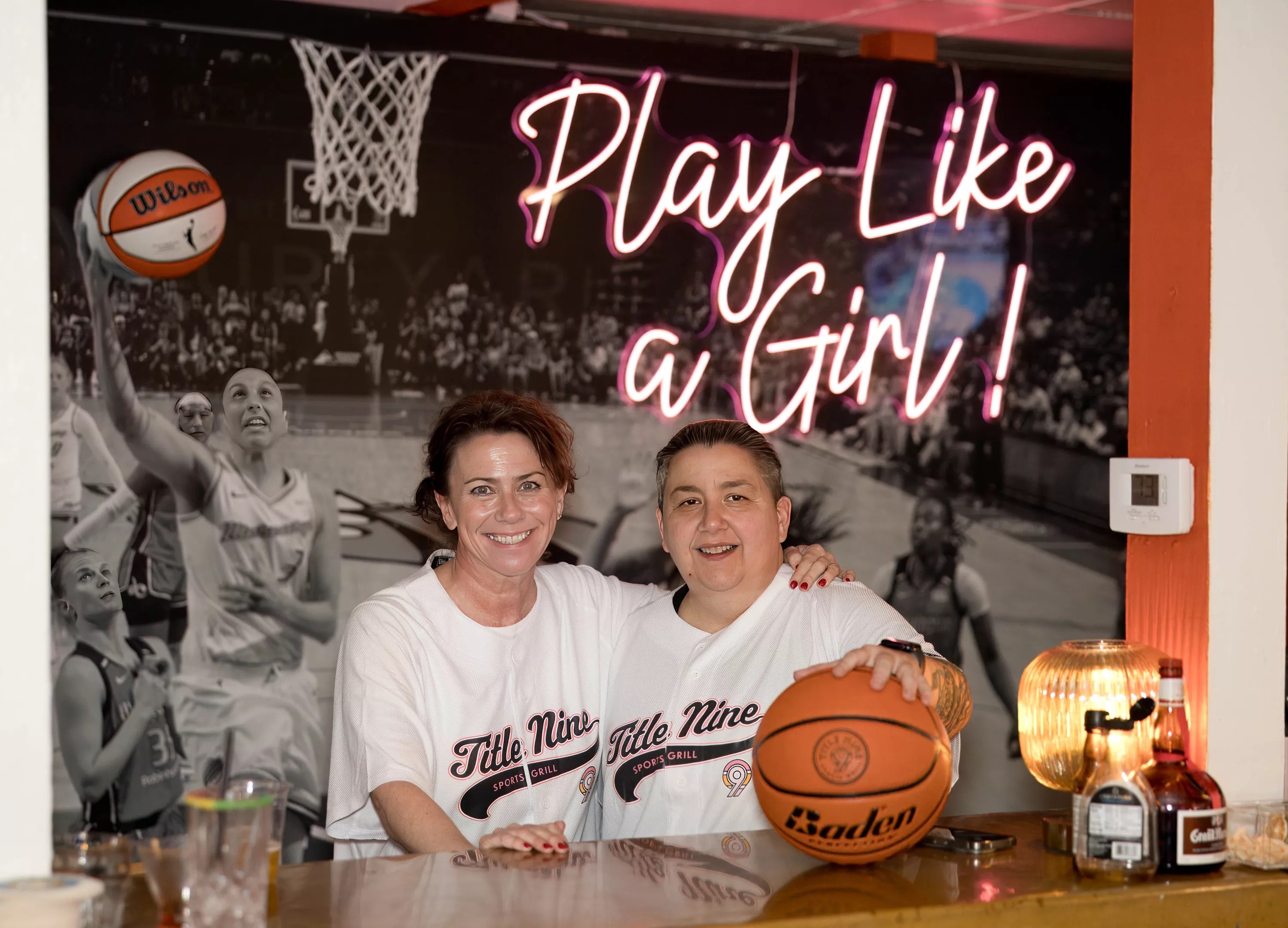
Allyson Stewart

Audio By Carbonatix
The day Audrey Corley stared down the barrel of a gun, her life changed.
Corley grew up in west Phoenix as the youngest of four kids. Her family was supportive, raising her to be tough and unafraid to go after what she wanted. A self-proclaimed tomboy, she played baseball and basketball often as the only girl on the team.
A knee injury took her away from the game. In middle school, her parents divorced and she took shifts at Burger Shoppe to help out, working upwards of 40 hours a week starting at 14. During her senior year, she was kicked out of Carl Hayden Community High School because of those absences. A vice principal told her she wouldn’t amount to anything.
One day she and a friend were held up at gunpoint for their money and jewelry. In the shock of the encounter, the 18-year-old promised herself she’d get her life together.
She got her GED and enrolled at Phoenix College in 1996 with two goals: to walk onto the basketball team and to study business. The stocky 5-foot-7 guard hadn’t picked up a ball in years and arrived out of playing shape. But she was determined.
“I wasn’t the best athlete on that team. I was probably the least athletically inclined at that point in my life,” Corley recalls. “I showed up every day and I worked hard. It’s what I think led to everything else.”
She was often late to practice, as she juggled classes and bartending jobs. On the court, that meant one thing: running extra laps.
Accountability and discipline were part of how coach Cassie Sawyer led her teams. In Corley, she saw an unwavering tenacity. What the guard lacked in traditional basketball education, she made up for with a “no-quit mentality” and being “a team leader and team player” who was steady at the free-throw line, Sawyer says.
Corley injured her knee four times. Each time, she weathered surgery to get back on the court. She saw every challenge as a test to make sure she really wanted what she was working toward.
“Basketball saved my life,” Corley says. “It came when I needed it.”
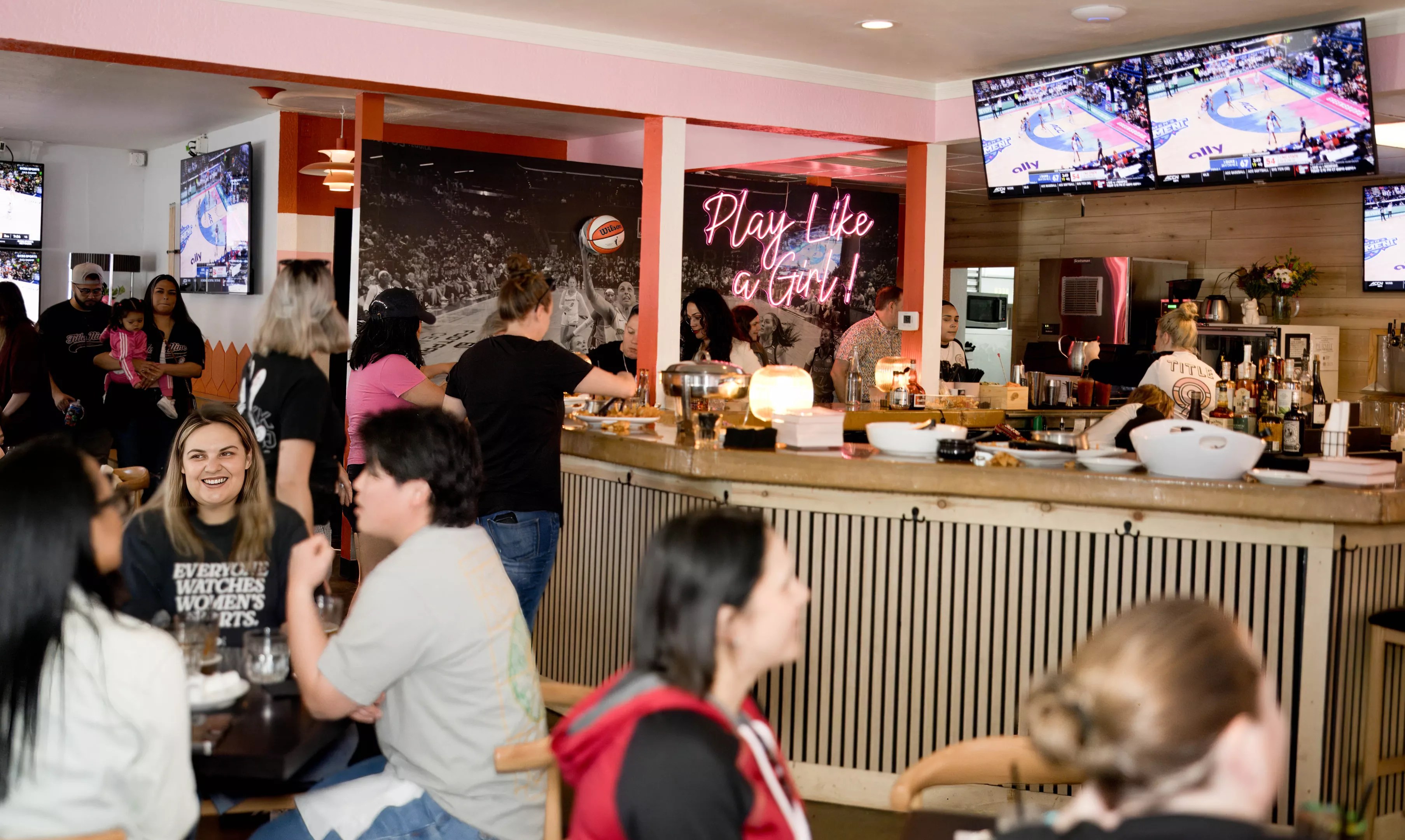
Title 9 is part of a growing list of women’s sports bars to open in the U.S. since the first debuted in 2022.
Allyson Stewart
A shining moment for women’s sports
More than 30 years later, the biggest headache for Corley and her business partner Kat Moore is getting their satellite provider on the horn. In the hours before welcoming family, friends and patrons to their new Melrose District bar, the co-founders of Title 9 Sports Grill are on the phone with DirecTV to ensure every women’s game they can find is playing on the 22 TVs.
The pressure is on for the duo, who have created Arizona’s first women’s sports bar and restaurant. TVs matter at any sports-centric spot, but for Title 9, Corely and Moore want to be certain they have their bases covered.
“When we started this, I was like ‘I don’t care about anything but the televisions,'” Moore says, sitting in the grill’s dining room amid chattering guests during Title 9’s opening weekend. “The extra catch is finding all those women’s games.”
Their opening weekend includes Selection Sunday – the day when the 68 teams for the NCAA men’s and women’s basketball tournaments are announced, kicking off March Madness. Basketball coverage is easy to find. But college baseball, tennis and beach volleyball games are also airing.
With nearly two dozen TVs, “you’re not going to miss a game here,” Corley says. But sometimes, that means they have to be “Nancy Drew” to find them, Moore notes.
The pair of long-time Melrose District hospitality vets officially opened the doors on March 15. Over a celebratory weekend, notable Phoenix faces appeared including Mayor Kate Gallego and Phoenix Mercury mascot Scorch.
The furry creature offers high-fives as customers walk inside following a ribbon-cutting ceremony. Corley and Moore hold a pair of oversized, baby-pink scissors. Their matching white Title 9 baseball jerseys have “Kat” and “Coach A” emblazoned across their backs.
The entrance features a wall covered in sports trophies and medals of all disciplines, donated by customers.
Near the host stand a toddler crawls into the low-slung, oversized chair in the shape of a baseball glove, a replica of one that the iconic Arizona Diamondbacks pitcher Randy Johnson owned. Above the chair hangs a black-and-white photo of Patsy Mink, the U.S. representative credited with authoring Title IX – the grill’s namesake and landmark legislation that prohibits discrimination in education based on sex. It also laid the groundwork to create more women’s sports teams in schools.
That homage to the past matters.
“I’m so into the history of it,” Moore says. “I feel like it’s our duty to respect that.”
More photos of iconic women – gymnast Simone Biles and the bygone Cantaloupe Queens amateur softball league – are mounted in clusters around the space. There’s an entire wall covered with a photo of Mercury legend Diana Taurasi driving to the hoop – embellished with a real basketball. A neon sign trumpets, “Play like a girl!”
That wall quickly becomes the backdrop for several photos, including with the owners. You can spot Moore by her wide smile and short, curly hair pulled back in pigtails. Corley is the gregarious bar maven with arm tattoos flashing against her crisp white jersey. Between snaps, the two are constantly in motion, flitting around the bustling dining area and patio. Well-wishers offer hugs and gifts, like a basketball etched with the tavern’s logo.
As the deliver plates of wings and sliders, they revel in the outpouring of interest and excitement from guests. They also hear eager viewing requests – for women’s soccer, softball and rock climbing.
“It’s on fire right now, and it’s overdue,” Corley says of women’s sports and spaces popping up to show those events.
“Way overdue,” Moore echoes.
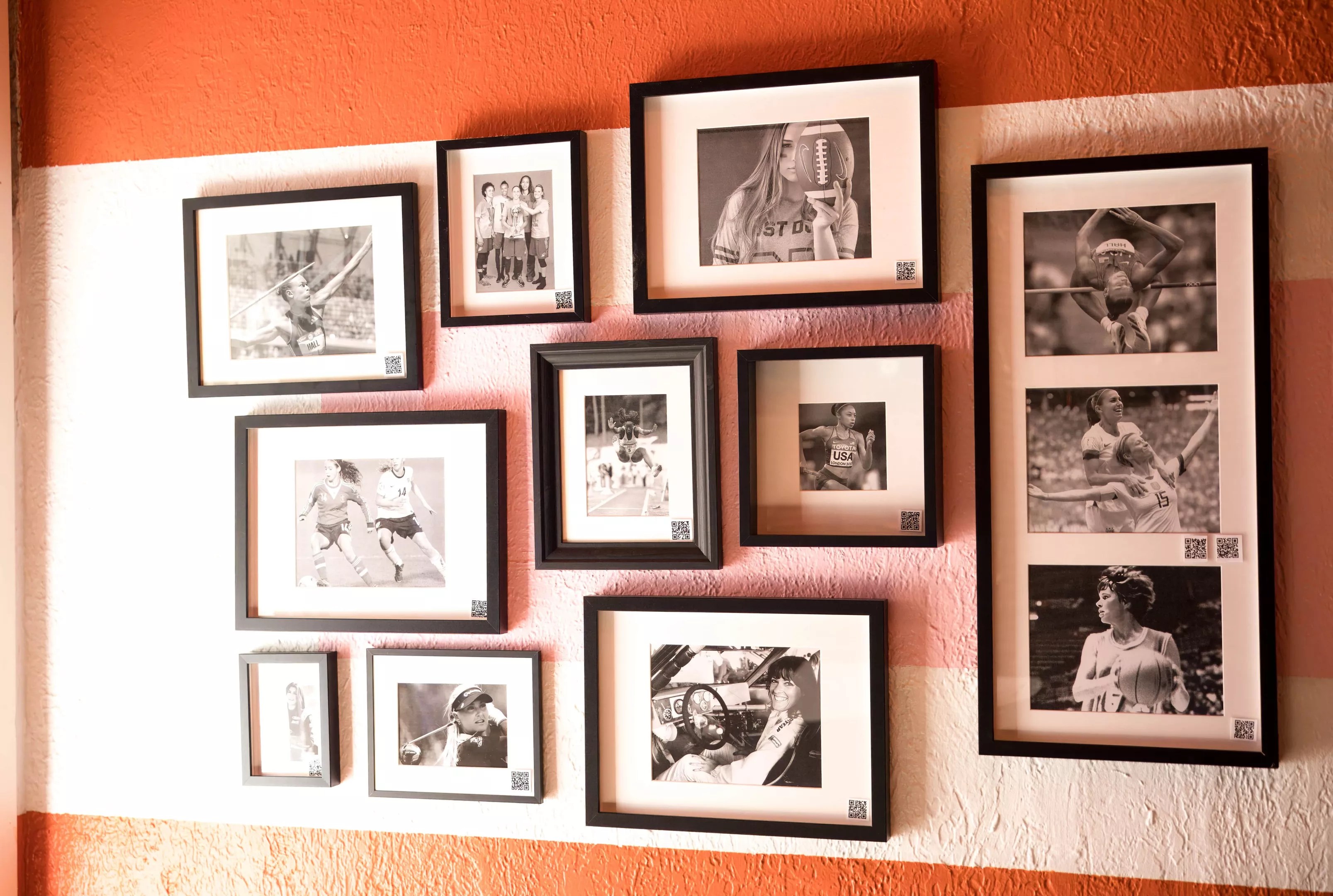
The owners of Title 9 Sports Grill honor women athletes, past and present, as well as the author of the landmark legislation for which the restaurant is named.
Allyson Stewart
Riding wave of interest, women’s sports bars emerge
Interest in women’s sports has been gaining momentum for decades, but 2024 was a banner year. The WNBA set viewership records. The Women’s NCAA basketball tournament final drew more viewers than the men’s. U.S. women dominated in Paris during the Summer Olympics, not only by outnumbering male athletes but also by raking in medals with record-breaking performances by Biles, Taurasi and swimmer Katie Ledecky.
Sports historian Victoria Jackson says women’s athletics garnered waves of interest in the 1930s, the 1970s and the 1990s. But the clinical associate professor at Arizona State University believes this moment is different.
No longer do a tiny handful of network execs control women’s sports programming. Fans can now find entire services dedicated to women’s sports, such as the All Women’s Sports Network Whoopi Goldberg launched in late 2024.
“Having this infrastructure is what sustains and maintains a wave so that it’s no longer a wave – it’s the status quo,” Jackson says.
Games on air is key. Sports bars dedicated to women’s athletics were virtually nonexistent until 2022, when the Sports Bra opened in Portland, Oregon.
It was the kind of place that Corley had dreamed of. The former basketball player and coach would often show Phoenix Mercury games on the TVs at her neighboring concept Boycott Bar. But she knew it wasn’t the reason people came in. The draw of her Melrose lesbian hotspot – the only one left in town – is providing a place where people can dance and be themselves.
Reading about the Bra, as fans call the Portland spot, got Corley’s gears turning. Since 2022, five similar concepts have opened across the country, according to X Marks the Spot, which highlights these spaces.
Title 9 is at least the seventh women’s sports bar to open in the U.S., per X Marks the Spot, and there are at least another 13 in the works.
It owes its existence to Corley’s uniquely fiery character and a chance meeting that forged her dream team.
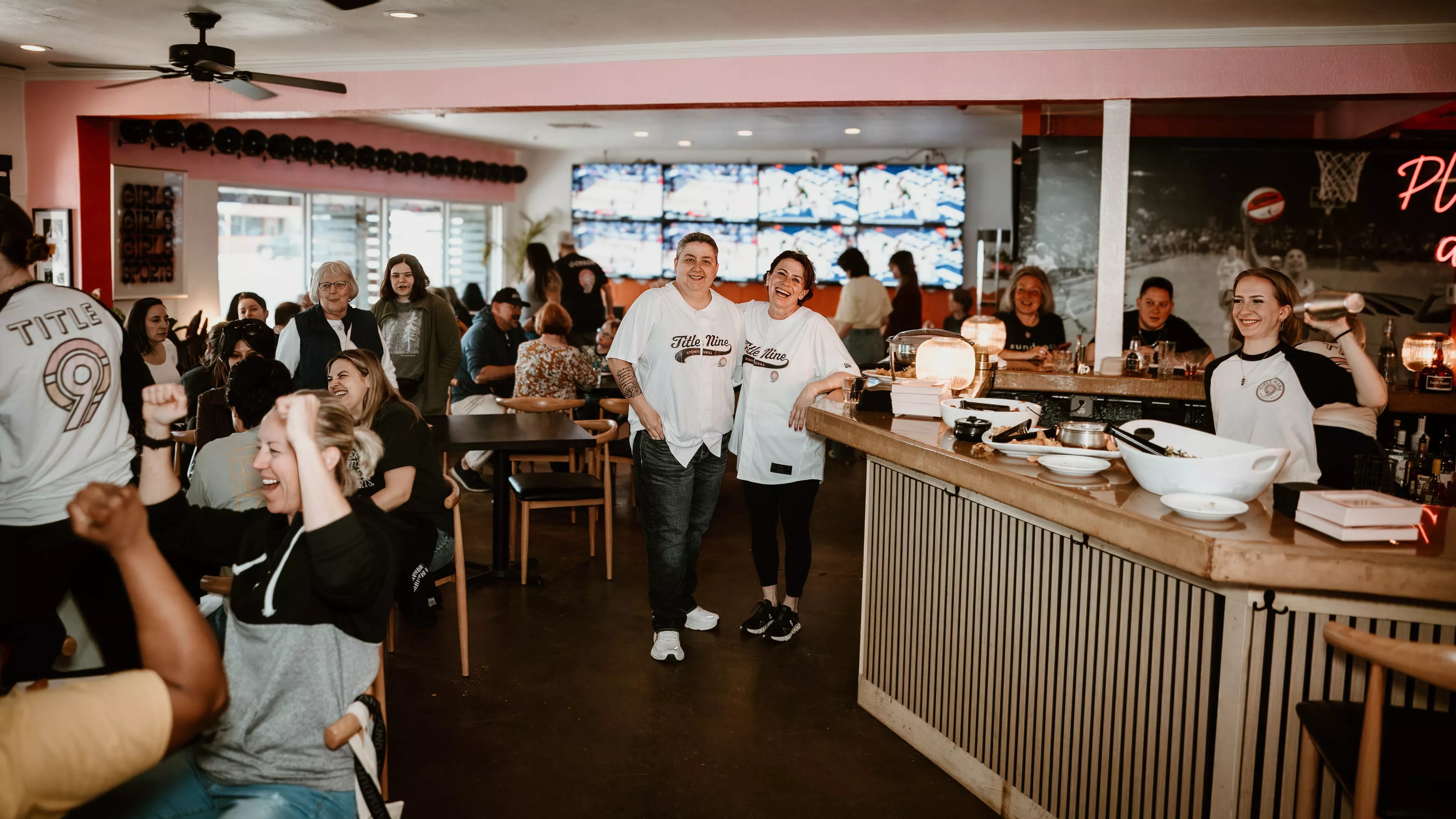
Kat Moore and Audrey Corley owned businesses on Seventh Avenue for years before they teamed up to open Title 9.
Allyson Stewart
Melrose neighbors team up
If Corley hadn’t found her way back to sports, she may never have opened Title 9 or anything else. After she was no longer eligible to play, Sawyer offered her an assistant coaching role. Corley quips she paid for that job, recalling that her first paycheck was $3.52. The money didn’t matter.
“I did it for the love,” Corley says. “I loved my team, I loved my coaches, I loved being part of something. I think what it comes down to for me is you’re part of something bigger than yourself.”
That first year of coaching was rough. She was the co-worker who suddenly got promoted. That didn’t sit well with some of her teammates, but as players moved on, she found better footing as “Coach A.”
What she lacked in technique, she made up for with charisma.
“I’d probably make you think you could walk through that wall,” she says. “I brought that energy to you, of believing in yourself.”
Corley coached – at two-year colleges and an elementary school – for a decade. She cut down nets and made runs deep into tournaments, but ultimately had to survive on her side hustles.
While she coached, Corley tended bar and ran the roaming dance party that would become the brick-and-mortar Boycott. These were two aspects of her life that she tried to keep separate. Late nights don’t exactly mix with morning shootarounds.
When Boycott was a roaming event, Corley could shape it to her schedule. Usually. “There were some times I was burning it at both ends,” she says. The night before the team had to travel to a tournament, Corley hosted a Boycott night. She finished at 3 a.m., went home, showered and headed to the airport for the 6 a.m. flight.
Despite the grind, Corley says her time coaching helped her as a restaurateur.
Faith Brenneman has worked with Corley at every bar and restaurant she’s run, including Title 9. She considers Corley a mentor who has coached her up the hospitality ladder.
“She definitely has pushed me to be better,” says Brenneman, who has gone from bartending to management. “She wants to put us in situations that bring us to our full potential.”
That started with Boycott, which opened on Seventh Avenue just north of Glenrosa Avenue in 2017. About a year later, Corley got new neighbors about a block south of her bar – Kat and Brad Moore’s Short Leash Hot Dogs.
Starting with a food truck in 2010, the Moores served gourmet hot dogs topped with unconventional ingredients like caramel corn and peanut butter. Brad’s mom, Markita Moore, recalls them surprising her with the truck at the Downtown Phoenix Farmers Market.
“Anything they take on, they take on with an attitude to be successful,” she says. “They go into it not just with their feet, they go into it with everything.”
The Moores’ novel menu drew a cult following that led them to open a permanent spot on Roosevelt Row in 2013, adding brioche doughnuts. When the Moores arrived in Melrose, their fans followed and they gained new ones with a bright, dog-friendly atmosphere and decadent eats.
Corley and Kat Moore quickly connected over the Melrose Street Fair and their mutual appreciation for good food and drinks.
They soon discovered another common interest: sports. Brad previously played soccer professionally, including for the former Arizona Sahuaros. Moore likewise grew up playing soccer. A first-team center midfielder from the age of 4, Moore was offered a scholarship at Duke University that she ultimately declined.
“There was nothing in my head that said I could make it as a soccer player,” she says. “So I just went in another direction.”
Like Corley, Moore still bears scars from her playing days, including the two metal plates and 14 screws in her left arm from a coed soccer game, which was also her second date with Brad. The lessons she learned on the pitch endure, too.
“I’m a good distributor,” Moore says.
In restaurants, that has translated to planning and process. Moore admittedly doesn’t seek the spotlight and endearingly refers to herself as a great support person, or “the girdle.”
Those traits set her apart from Corley, who’s allergic to paperwork. But complementary skills define championship teams.
Brad says he couldn’t be prouder of Moore for stepping out from behind the scenes to open Title 9.
“Short Leash was such a great run for us,” he says. “The restaurant business is so unique because it involves so many different things, and my experience with her, is she’s so good at so many of them.”
As the neighbors got to know each other over the years, they talked about collaborating. Then the pandemic took hold, and their attention turned to survival.
Over time, other opportunities emerged. In 2023, Corley opened her first restaurant, Dahlia Tapas, Tequila & Wine. It became one of Phoenix New Times’ best new restaurants of the year and remains among our Top 100 restaurants.
In 2024, the Moores announced they had sold the Short Leash concept. The new owners decided not to take over the restaurant in Melrose. As they considered what to do with the building, Moore says she thought of Corley, who suggested a tavern celebrating women’s sports. Moore loved the idea.
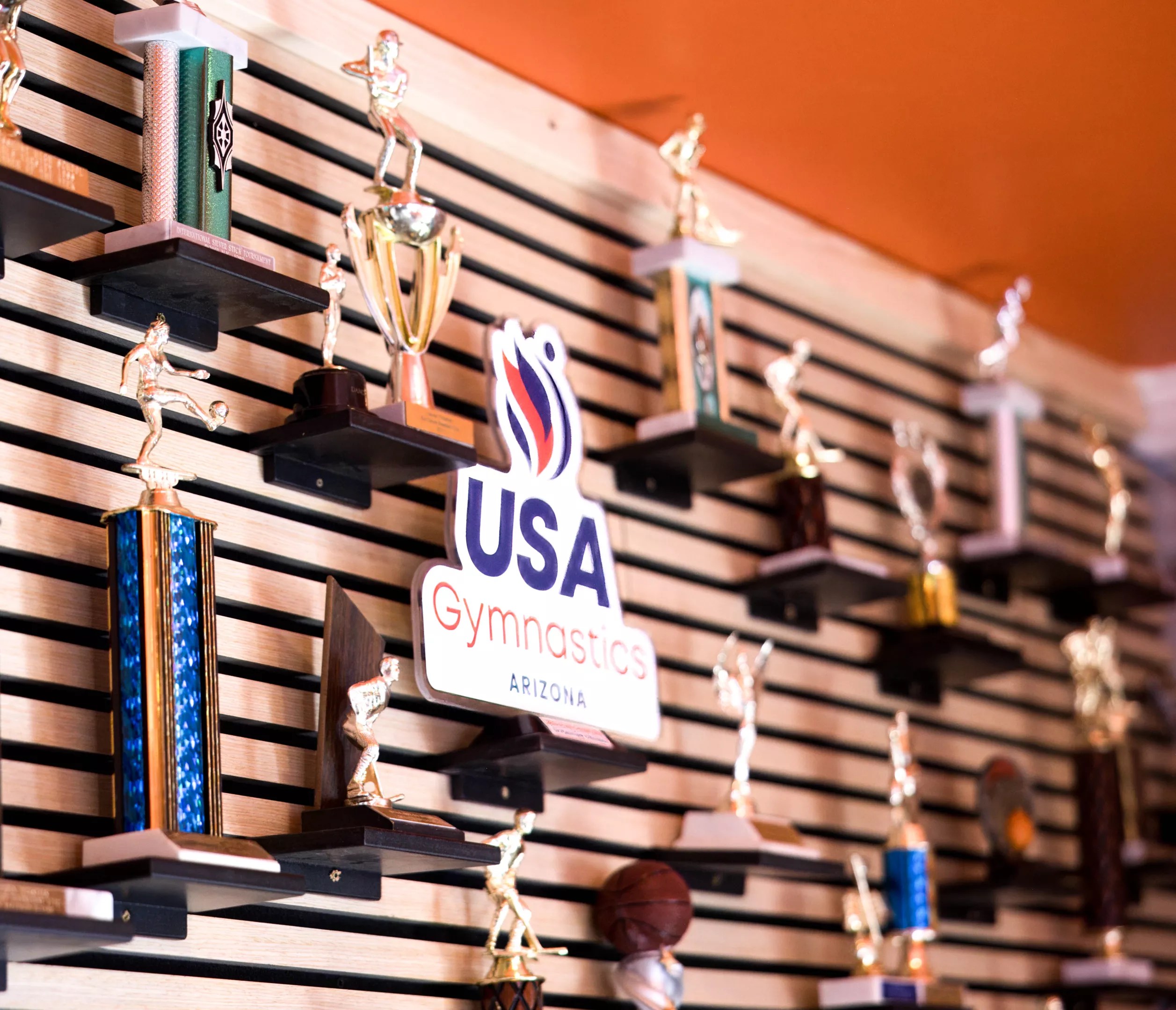
Patrons have donated sports memorabilia, trophies and medals that decorate the foyer of Title 9.
Allyson Stewart
A sports bar built with women in mind
Corley and Moore designed Title 9 with women in mind. That meant opting for lots of natural light and colors that are “bright and happy and somewhat feminine,” Moore says. The chairs and bar stools in the dining room are padded to make a few hours of watching a game more comfortable.
Megan Greenwood understands what it’s like to carve out a space for women in a male-dominated area. Greenwood Brewing is one of the state’s few woman-owned breweries. When Greenwood opened her taproom downtown in 2020, the airy space, decorated with shiplap, natural stone and curved brass lamps, felt distinct from the industrial man-cave aesthetic frequently found at craft beer bars.
“Women aren’t always considered when creating a space,” Greenwood says. “When they are considered, you can really tell.”
When Greenwood was opening her taproom, women voiced requests for comfort, safety and cleanliness – traits of a bar that should be implicit but aren’t always a guarantee.
Patrons at Title 9’s opening weekend clocked those kinds of details. Some said Title 9 was the type of place they’d feel comfortable going to solo or could leave a drink unattended without concern. Others are looking forward to seeing women’s games.
“I’ve gone to other sports bars before specifically to watch a women’s soccer game,” says Bea Ronan, sipping an Espresso Marta-tini on Title 9’s patio under an orange umbrella. No more having to find a bartender, ask them to put the game on and to know the channel. “It’s like, OK, here we go!” she says. “At least here I know there’s a chance it’s already on.”
There is also a sense of celebration, not the gatekeeping that women often encounter at sports bars.
“I don’t feel like I’m going to get quizzed when I say that I like sports,” Jennifer Wolf says in the dining room. Her T-shirt reads: “Everyone watches women’s sports.”
The food and drinks are a key part of the vibe, too. Ronan’s friend Melina Cox-Ferreras noticed that Greenwood is among the beer options.
“It’s really cool to see them collaborate; I like that,” Cox-Ferreras says.
The Greenwood beer on tap is Herstory Pale Ale, which is also poured at Phoenix Mercury games. It’s one of several beers, ciders and wines from women makers available at Title 9, which also includes Drop of Sunshine, Bivouac Ciderworks and the gluten-free Holidaily Brewing Co.
The cocktail menu features classic drinks named in honor of iconic athletes – the Biles Bloody Mary, the Billie Jean Spritz, the Coco Gauff Colada. Corley also came up with signature drinks for herself and Moore. The Coach A is a Cadillac margarita made with Don Julio 1942. The Kicking Kat Collins is a spicy, pear-infused take on the gin-based sparkler.
There’s plenty of food to pair with those drinks. You can load up on gut-busting game-day snacks like loaded fries, onion rings and sliders topped with gooey pimento cheese and bacon, or find lighter options such as cauliflower wings, a broccolini sandwich and a quinoa salad.
On opening weekend, Kris and Robbie Burgess rocked Mercury Ts as they sipped Bloody Marys. They gave Corley the branded basketball, explaining that the bar owner is like family. Robbie’s sister played basketball with Corley at Phoenix College. Now the Burgesses have a 19-year-old daughter playing college basketball in Michigan.
“To know that these places are opening up and she’s going to have a place she can go to enjoy sports with her friends, I love it,” Kris says.
While Title 9 undoubtedly focuses on women’s sports, it’ll also air men’s games – something that held true during the opening weekend.
“We’re not excluding men by any means,” Corley says, “But this is for the women, and it’s about the women, and it’s about time.”
The owners want Title 9 to become a destination. And not just for this moment when America is starting to realize that everyone watches women’s sports.
“At the end of the day, we’re a space where people can come and enjoy community, come together and dream,” Corley says. “A little girl can come sit here and dream about being on these TVs. With that comes action. We don’t even know how great this is going to be. But we’re here for it. And we’re excited.”
Title 9 Sports Grill
4221 N. Seventh Ave.